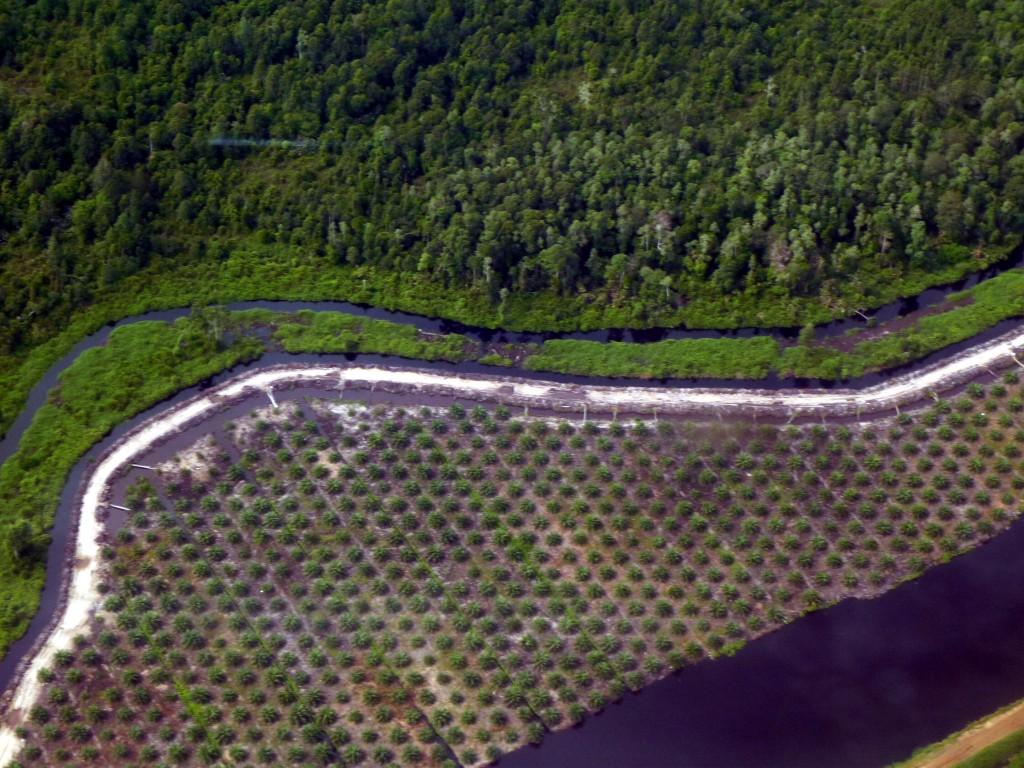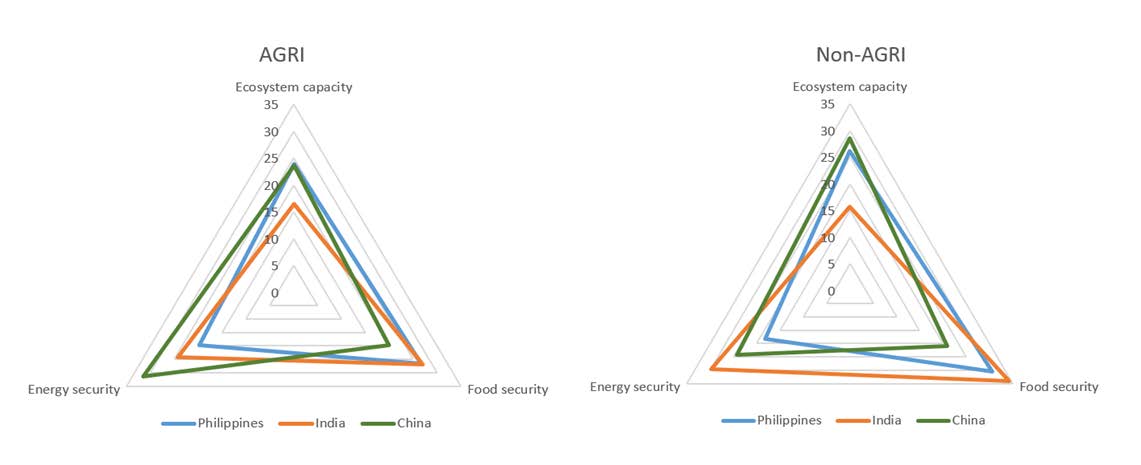Summary
|
The sustainability of bioenergy has raised doubts among experts in both the science and policy communities due to the interdependence, and thus inherent trade-offs, between energy security, food security and ecosystem capacity. The case study on the role of bioenergy in the energy-food-ecosystem nexus (or “interconnection”) in countries like the Philippines, India and China are very relevant to policy and society as they are both producers and consumers of biofuel. Energy security is one of the most often cited policy objectives for bioenergy development due to the short-term volatile prices and long-term dwindling supply of fossil fuels, particularly oil, which can destabilise the economy (Acosta-Michlik et al., 2011). Policies that promote bioenergy (e.g. biofuel blending, green economy) have resulted in a dramatic increase in the global production and trade of both raw feedstock (e.g. sugarcane, palm, etc.) and biofuels (i.e. bioethanol and biodiesel) (Acosta et al., 2014). However, bioenergy production has resulted in many unintended adverse impacts on the society. Land expansion for feedstock production in developing Asian countries is mostly driven by private investors, in some cases, resulting in displacement of local farmers and residents. In recent years, bioenergy trade has exerted undesirable impacts not only on specific communities due to social displacement, but also on the entire population of countries due to its threat on food security. Moreover, the widespread system of bioenergy production is causing degradation of the ecosystem, resulting in conversion of forests into monoculture plantations of soybean, sugarcane, corn, or palm.

A “Nexus” Approach
Authors: Prof. Dr. Lilibeth Acosta-Michlik, Potsdam Institute for Climate Impact Research (PIK), Germany; Prof. Damasa B.M. Macandog, University of Philippines, Philippines; Prof. Dr. K. S. Kavi Kumar, Madras School of Economics, India; Dr. Xuefeng Cui, College of Global Change and Earth System Science, Beijing Normal University, China ; Ms. Elena A. Eugenio, Ms. Paula Beatrice M. Macandog, Mr. Arnold R. Salvacion, Ms. Jemimah Mae A. Eugenio, University of Philippines, Philippines.
Trade-offs in bioenergy are increasingly taken into account in “nexus” studies because understanding the form of trade-offs can help avoid the selection of extreme and single-objective management policies. The present case study of the energy-food-ecosystem nexus aims to inform on the need for not only a redirection in government policy but also a change in societal behaviour. The study focuses on analysing societal behaviour, in particular the perceptions and preferences that influence behaviour towards sustainable bioenergy. The analysis is based on choice-based conjoint surveys of respondents representing different parts of society in the Philippines, India and China.
Diverged Views
Across all three countries, the majority of respondents are of the opinion that bioenergy is good for the economy (Table 1). But, opinions on the effects of bioenergy on food security generally diverged. About half of the Philippine respondents from both AGRI and NON-AGRI professions think that bioenergy has negative effects on food security. In India, while half of the AGRI respondents have the opinion that bioenergy affects food security, only about a quarter of the NONAGRI respondents think the same. The NON-AGRI respondents in this country have high level of education and are living in urban areas. It could be that they are either less informed or less affected, and thus less concerned, by the conflicting issues between bioenergy production and food security. In China, there is a reverse pattern of opinion. About half of the NON-AGRI respondents think that bioenergy affects food security, and only less than a quarter of the AGRI respondents think the same. The AGRI respondents in China are characterised by very low education and mainly living and working in farms. This could explain their lack of awareness on the impacts of bioenergy production on food security.
| Knowledge and Familiarity | Philippines | India | China | |||
| AGRI | NON-AGRI | AGRI | NON-AGRI | AGRI | NON-AGRI | |
| Familiar with the term bioenergy | 74.0 | 87.0 | 100.0 | 100.0 | 36.5 | 63.8 |
| Work is related to bioenergy | 28.4 | 6.1 | 95.6 | 94.3 | 7.7 | 11.2 |
| Bioenergy affects food security | 62.4 | 42.0 | 50.0 | 21.4 | 15.4 | 50.9 |
| Bioenergy is good for the economy | 94.7 | 95.0 | 98.9 | 100.0 | 98.1 | 92.2 |
| Note: The table refers to responses from about 600 survey respondents. AGRI refers to agriculture-related and NON-AGRI to non-agriculture professions. The values are percentages of the total respondents in each work category. For the opinion on bioenergy, respondents were asked to answer “yes” or “no”. The values presented in the table are only the percentage of respondents who answered “yes”. | ||||||
| Table 1. Knowledge and familiarity on bioenergy, by country and profession. | ||||||
Figure 1 compares the relative importance of energy security, food security and ecosystem capacity based on the respondents’ preference levels. There is an obvious disparity in the relative importance of these sustainability variables across the three countries and between the two professional segments. In the Philippines, food security and ecosystem capacity are the most important factors for both AGRI and NON-AGRI respondents as far as promoting sustainable bioenergy is concerned. Awareness on the impact of environmental degradation on vulnerability to floods and landslides is increasing in the Philippines, which could explain the high preference for ecosystem capacity (Acosta et al., 2014). Although the Philippines has one of the highest energy prices in Asia, it has very good sources of other forms of renewable energy like hydropower and geothermal energy. This may explain why energy security using bioenergy is not a high priority goal in this country. In India, NON-AGRI respondents are more concerned about food security as shown by the highest level of preferences not only in comparison to AGRI respondents in India, but also to respondents in the other two countries. Next to food security, energy security is an important concern for respondents, in particular those with a NON-AGRI profession who live mainly in urban and suburban areas. The preferences for ecosystem capacity is lowest in India. In China, the AGRI respondents consider energy security and NONAGRI respondents consider ecosystem capacity as the most important sustainability factors for bioenergy development, respectively. The latter may be explained by the concern for environmental problems like air pollution in Chinese cities. These results suggest that preferences for sustaining energy security, food security and ecosystem capacity are influenced by the socio-economic circumstances and needs of the people.

Policy ImplicationsA significant number of respondents perceived bioenergy as beneficial for the economy, although many of them think that it affects food security. Policies promoting bioenergy may have provided a general perception in society about its economic benefits, despite the negative implications on food security and ecosystem capacity. Moreover, the preferred role of bioenergy for sustainable development reflects the general social and economic concerns in the respective countries, e.g. energy security in China, food security in India, and ecosystem degradation in the Philippines. This implies that society expects that bioenergy development could contribute to addressing these socio-economic problems. Thus, policy should carefully weigh the impacts of bioenergy development on sustainability issues that are closely interconnected in an energy-food-ecosystem nexus because society may favour one or two sustainability issues at the cost of another issue. |
Recommendations
|
| This policy brief is developed for APN project “Integrated Sustainability Assessment of Bioenergy Potentials in Asia: An Application of A Hybrid Approach on Trade-offs and Pathways (PIC-STRAP)” (LCI2012-04NMY(R)-Macandog; LCI2013-04CMY(R)-Macandog) under APN’s Low Carbon Initiatives Framework. It is also a summary of an article submitted to the Special Issue “Sustainable Agriculture” of the journal Agriculture. For full details of this project, including technical reports and other outputs, please visit the project metadata page. |